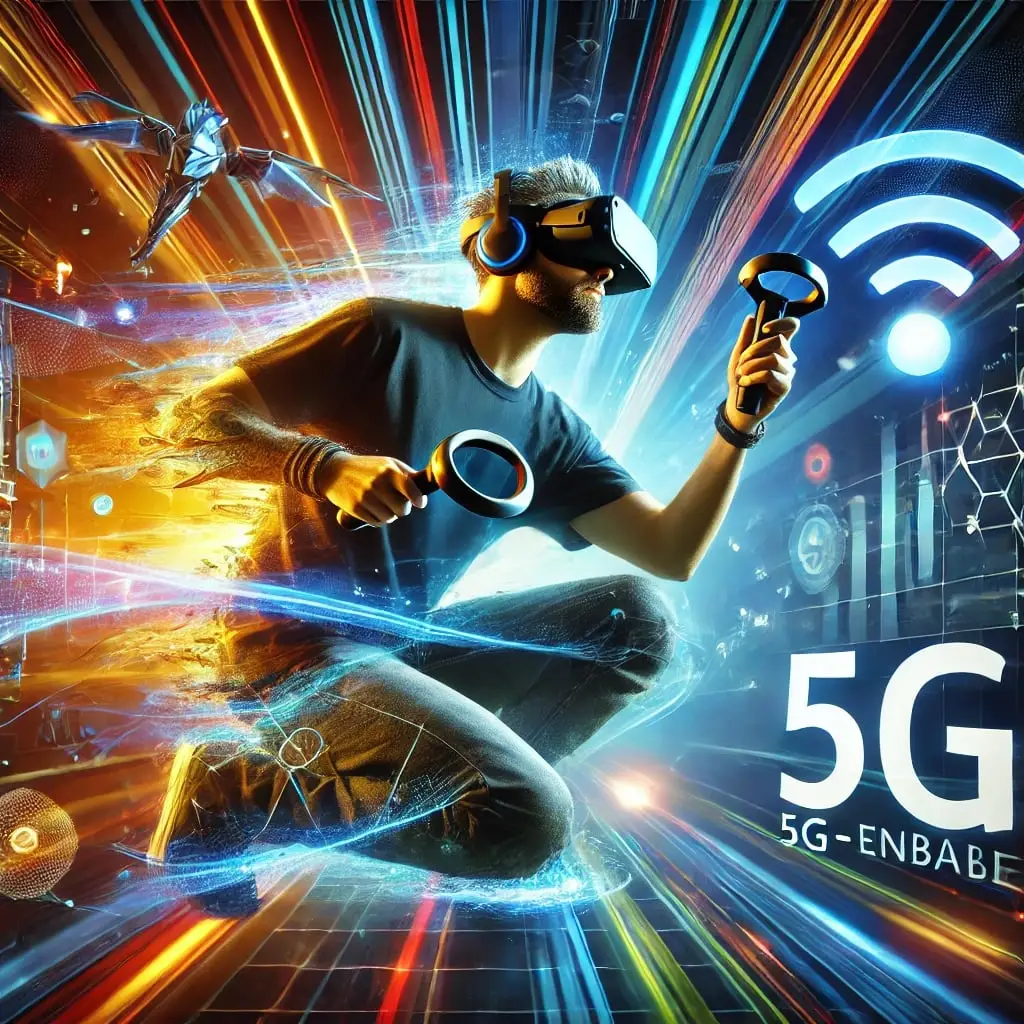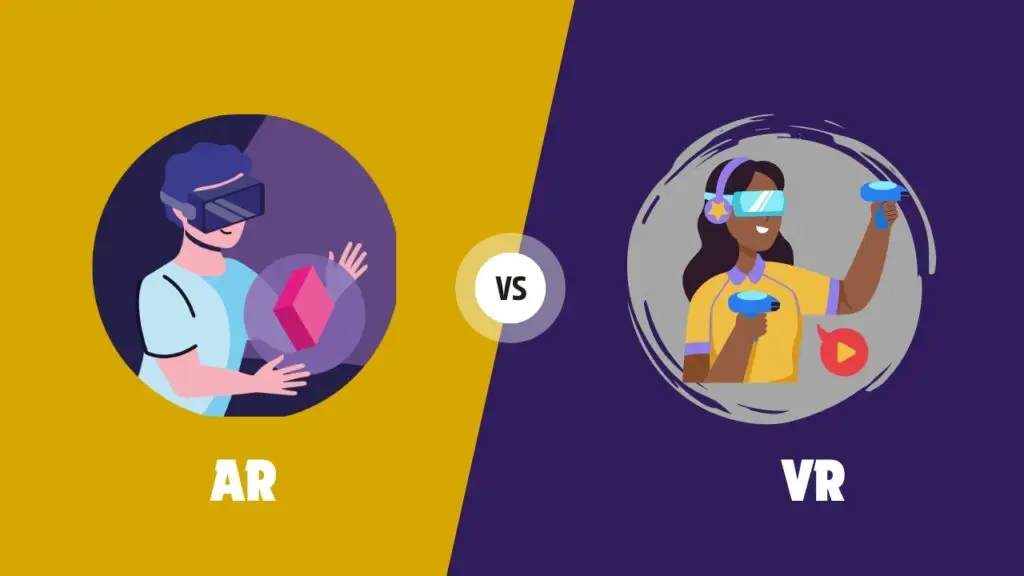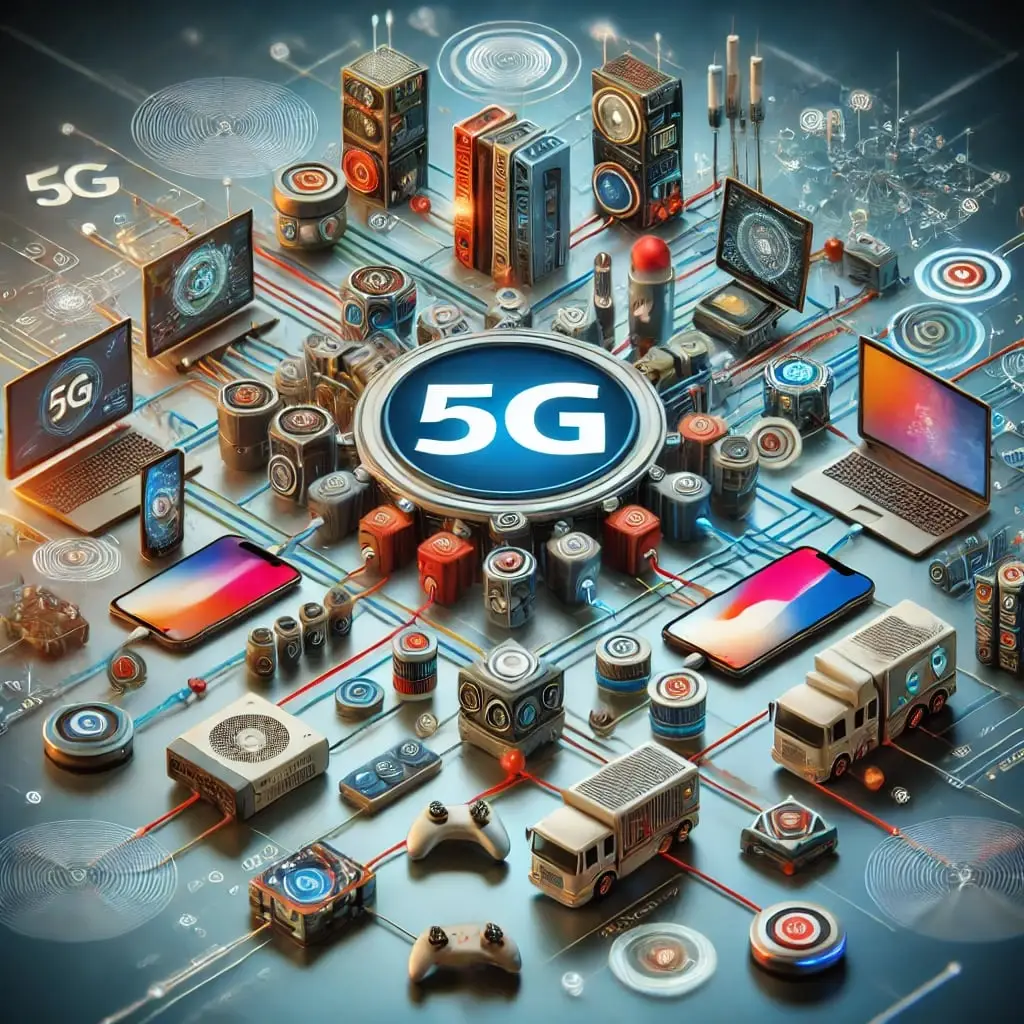Introduction
In the ever-evolving world of technology, 5G has emerged as a game-changer, transforming various industries with its lightning-fast speed and unprecedented connectivity. One sector experiencing a significant revolution due to 5G is gaming. Welcome to the era of 5G gaming, where ultra-low latency, faster download speeds, and increased network capacity are redefining how we play, interact, and experience games. Whether you’re a casual mobile gamer or a dedicated eSports enthusiast, 5G gaming promises to elevate your gaming adventures to new heights.
Imagine diving into a multiplayer battle with virtually zero lag, streaming your favorite games in stunning clarity without a hitch, or exploring augmented reality (AR) and virtual reality (VR) worlds that feel incredibly lifelike. These are just a few of the exciting possibilities that 5G technology brings to the table. As we delve deeper into the impact of 5G on gaming, we’ll explore the key features that make 5G gaming a ground-breaking advancement, the challenges it faces, and what the future holds for gamers around the globe.
So, what exactly sets 5G gaming apart from its predecessors? Let’s start by examining how this next-generation technology is revolutionizing mobile and cloud gaming…
The Evolution of 5G Gaming
From 4G to 5G: A Game Changer
The leap from 4G to 5G technology marks a significant milestone in the gaming industry. While 4G laid the groundwork for mobile gaming, enabling players to connect and compete on the go, it had its limitations. Lag, slower download speeds, and network congestion often hampered the gaming experience. Enter 5G, with its promise of ultra-low latency, blazing-fast speeds, and vastly improved network capacity. This transition isn’t just an incremental upgrade; it’s a game-changer that redefines what’s possible in mobile and cloud gaming.

With 5G gaming, the days of frustrating lag are behind us. Gamers can now enjoy seamless, real-time interactions, crucial for competitive multiplayer games. The enhanced speed also means that downloading large game files and updates, which could take hours on a 4G network, is now a matter of minutes. Furthermore, the increased network capacity of 5G allows for more devices to connect simultaneously without compromising performance, making massively multiplayer online games (MMOs) and large-scale eSports events more feasible than ever.
The Role of 5G in Mobile and Cloud Gaming
Mobile gaming has seen a meteoric rise, becoming a dominant force in the gaming industry. However, it wasn’t until the advent of 5G that mobile gaming truly started to unlock its full potential. With 5G, mobile gamers can experience console-quality games on their handheld devices, thanks to the network’s ability to handle high-bandwidth applications effortlessly. This is particularly beneficial for graphically intensive games that demand a stable and fast connection.
Cloud gaming is another area where 5G is making a substantial impact. Services like Google Stadia, NVIDIA GeForce Now, and Microsoft’s Xbox Cloud Gaming rely on robust internet connections to stream games directly to devices without the need for high-end hardware. 5G’s low latency and high-speed capabilities ensure that these games run smoothly, providing a near-instantaneous response that rivals traditional gaming setups. This opens up a world of possibilities for gamers who can now access and play high-quality games anytime, anywhere, without being tethered to powerful gaming rigs.
As we continue to explore the transformative effects of 5G on gaming, it’s clear that this technology is not just enhancing existing experiences but also paving the way for new and innovative gaming paradigms. Next, let’s dive into the key features of 5G gaming that are setting it apart from its predecessors…
Key Features of 5G Gaming
Ultra-Low Latency and Its Impact on Gaming
One of the most transformative features of 5G gaming is its ultra-low latency. Latency, or the delay before a transfer of data begins following an instruction, is a critical factor in gaming, especially in fast-paced, competitive environments. Traditional 4G networks often suffer from latency issues, causing lag that can be frustrating for gamers. With 5G, latency is reduced to mere milliseconds, ensuring real-time responsiveness. This means smoother gameplay, quicker reactions, and a more immersive gaming experience. Whether you’re playing an intense first-person shooter or a strategic multiplayer online battle arena (MOBA) game, the reduced latency of 5G ensures your actions are executed instantly.
Faster Download and Upload Speeds
Another significant advantage of 5G gaming is the dramatic increase in download and upload speeds. These enhanced speeds facilitate rapid downloads of large game files and updates, drastically reducing waiting times. In the past, downloading a new game or a substantial update could take hours on a 4G network. With 5G, these downloads are completed in a fraction of the time, allowing gamers to get back to playing quickly. Moreover, faster upload speeds mean that streaming gameplay, whether for personal enjoyment or for an audience, is smoother and of higher quality. This is particularly beneficial for content creators and streamers who rely on high-speed uploads to broadcast their gameplay live without interruptions.
Increased Network Capacity
The increased network capacity of 5G is another game-changer, particularly for multiplayer gaming and large-scale events. 5G networks can support a significantly higher number of connected devices without compromising performance. This is crucial for games that involve large numbers of players, such as massively multiplayer online games (MMOs) and eSports tournaments. With 5G, gamers can enjoy stable connections even in densely populated areas, ensuring a consistent and reliable gaming experience. This also opens up opportunities for more complex and ambitious gaming experiences, where thousands of players can interact in real-time within the same game environment.
As we explore these key features, it’s evident that 5G gaming is not just an incremental improvement but a revolutionary leap forward. The benefits of ultra-low latency, faster download and upload speeds, and increased network capacity are transforming how we play and experience games. Next, let’s look at some of the exciting use cases and innovations that 5G gaming is enabling, from augmented reality (AR) and virtual reality (VR) to enhanced multiplayer and cloud-based gaming experiences…
5G Gaming Use Cases and Innovations
Augmented Reality (AR) and Virtual Reality (VR)
One of the most exciting use cases of 5G gaming is its application in augmented reality (AR) and virtual reality (VR). These technologies have been on the horizon for years, but their full potential is only now being unlocked with the advent of 5G. The high-speed, low-latency capabilities of 5G networks are perfect for AR and VR applications, which require real-time data processing and minimal lag to provide immersive experiences. With 5G, gamers can enjoy lifelike AR and VR games that react instantly to their movements, creating a more engaging and immersive environment.

For instance, imagine playing a VR game where you’re not just a passive observer but an active participant in a fully realized virtual world. The seamless integration of 5G means that these experiences are not only more responsive but also visually stunning, with higher-resolution graphics and smoother motion tracking. AR games, too, benefit from 5G by providing more interactive and dynamic gameplay, where digital elements blend seamlessly with the real world. If you’re interested in learning more about VR technology, check out our article on Apple Vision Pro vs Meta Quest 3: Choosing the Best VR Experience.
Multiplayer and Cloud-Based Gaming
Multiplayer gaming has always been about connectivity, and 5G is taking this to the next level. The enhanced network capacity and ultra-low latency of 5G allow for larger, more complex multiplayer games where players can interact in real-time without the frustration of lag. This is particularly beneficial for eSports and large-scale multiplayer online games (MMOs), where the difference between victory and defeat can be milliseconds.
Additionally, 5G is revolutionizing cloud-based gaming. Services like Google Stadia, NVIDIA GeForce Now, and Microsoft’s Xbox Cloud Gaming are becoming increasingly popular, allowing gamers to stream high-quality games directly to their devices without the need for expensive hardware. The high-speed, reliable connections provided by 5G ensure that these games run smoothly, offering a console-like experience on any device. This accessibility opens up gaming to a broader audience, allowing more people to enjoy high-end gaming experiences without investing in gaming consoles or powerful PCs.
Enhanced Social and Interactive Gaming Experiences
5G also enables more interactive and social gaming experiences. For example, games can incorporate real-time voice and video communication, allowing players to coordinate strategies or simply chat while playing. This adds a social dimension to gaming that enhances the overall experience. Moreover, 5G supports innovative features like live-streaming gameplay in high definition, enabling players to share their gaming experiences with a global audience in real time.
As we delve deeper into the transformative potential of 5G gaming, it’s clear that this technology is enabling new forms of gameplay and interaction. From immersive AR and VR experiences to enhanced multiplayer and cloud gaming, 5G is pushing the boundaries of what’s possible in the gaming world. Up next, we’ll explore the challenges and considerations that come with this technological leap, ensuring a balanced view of the future of 5G gaming…
Challenges and Considerations in 5G Gaming
Infrastructure and Accessibility
While 5G gaming holds immense promise, one of the primary challenges is the current state of infrastructure and accessibility. The deployment of 5G networks is still in its early stages, and widespread availability is limited to major urban areas. This means that gamers in rural or less developed regions may not experience the benefits of 5G for some time. Moreover, the installation of 5G infrastructure, such as new towers and base stations, requires significant investment and coordination among telecom providers, governments, and local authorities. Ensuring that these networks are robust and reliable is essential for delivering the seamless gaming experiences that 5G promises.

In addition to physical infrastructure, there is also the consideration of device compatibility. Not all existing gaming devices are equipped to handle 5G connectivity, and gamers may need to invest in new hardware, such as 5G-enabled smartphones, routers, or gaming consoles, to take full advantage of the technology. This can be a barrier for some users, especially given the higher costs associated with the latest devices.
Security Concerns
With the increased connectivity and data transfer speeds that 5G offers, there are also heightened security concerns. The expanded network surface can potentially expose more vulnerabilities, making it a target for cyberattacks. Gamers, who often share personal information and financial details online, need to be aware of these risks and take necessary precautions. Ensuring secure connections, using strong authentication methods, and regularly updating software are critical steps in safeguarding against potential threats.
Moreover, developers and service providers must prioritize security in their 5G gaming platforms. This includes implementing robust encryption methods, regularly monitoring suspicious activities, and providing users with clear guidelines on how to protect their accounts. As 5G gaming becomes more prevalent, maintaining a secure and trustworthy environment will be paramount to its sustained success.
In addition to leveraging the latest in 5G technology for gaming, it’s crucial to ensure your digital life remains secure. Learn more about how to protect your online presence with these updated strategies for 2024.
Data Consumption and Costs
Another important consideration in 5G gaming is data consumption and the associated costs. The high-speed, high-quality experiences that 5G enables can significantly increase data usage, leading to higher bills for gamers who are not on unlimited data plans. Streaming high-definition games or participating in data-intensive multiplayer sessions can quickly add up, potentially making 5G gaming less affordable for some users.
Telecom providers will need to offer competitive data plans and packages that cater to the needs of gamers, ensuring that the costs of enjoying 5G gaming remain manageable. Additionally, users should be mindful of their data usage and consider options such as Wi-Fi offloading when available to mitigate the financial impact.
As we navigate these challenges, it’s crucial to balance the excitement around 5G gaming with a realistic understanding of its limitations and potential obstacles. By addressing these issues proactively, the gaming industry can ensure that the transition to 5G is smooth and beneficial for all players. Now, let’s look forward to the future of 5G gaming and explore the trends and innovations on the horizon that will continue to shape this dynamic landscape…
The Future of 5G Gaming
Predictions and Trends
As 5G technology continues to expand and mature, its impact on the gaming industry is expected to grow exponentially. One of the most exciting trends we can anticipate is the further integration of augmented reality (AR) and virtual reality (VR) into mainstream gaming. With 5G’s ultra-low latency and high-speed connectivity, AR and VR experiences will become more immersive and responsive, allowing gamers to explore new worlds and interact with digital environments in ways previously unimaginable.
Moreover, 5G gaming is likely to fuel the rise of cloud-based gaming platforms. Companies like Google Stadia, NVIDIA GeForce Now, and Microsoft’s Xbox Cloud Gaming will continue to innovate, offering gamers access to vast libraries of high-quality games without the need for expensive hardware. This shift will democratize gaming, making it more accessible to a broader audience and reducing the barrier to entry for new players.
Another trend to watch is the development of smart cities and connected environments, where 5G networks enable seamless integration of gaming into everyday life. Imagine playing a location-based AR game that interacts with real-world landmarks and events, or participating in large-scale multiplayer games that span entire cities. These experiences will blur the lines between the digital and physical worlds, creating new opportunities for interactive entertainment.
Potential Impact on the Gaming Market
The economic implications of 5G gaming are substantial. The increased demand for 5G-compatible devices, such as smartphones, tablets, and VR headsets, will drive innovation and competition in the tech market. Game developers and publishers will also benefit from the expanded capabilities of 5G, enabling them to create more complex and engaging games that leverage the full potential of the technology.
Furthermore, the growth of 5G gaming will likely spur the expansion of eSports and competitive gaming. With more reliable and faster connections, eSports tournaments can be hosted on a larger scale, attracting more participants and viewers. This will not only boost the popularity of eSports but also open up new revenue streams through sponsorships, advertising, and media rights.
As we look ahead, the future of 5G gaming is incredibly promising. The advancements in technology and the innovative applications of 5G will continue to transform the gaming landscape, offering richer, more immersive experiences for players worldwide. This journey into the future of gaming is just beginning, and the possibilities are endless.
Your Top 5G Gaming Questions Answered
To ensure you’re fully prepared to dive into the world of 5G gaming, let’s address some common questions and concerns. Whether you’re curious about the technical aspects or the practical implications, we’ve got you covered. Let’s explore these queries to enhance your understanding and help you make the most of this exciting technology.
FAQs
u003cstrongu003eWhat is 5G gaming and why is it important?u003c/strongu003e
5G gaming uses fifth-generation wireless technology to improve gaming with ultra-low latency, faster speeds, and increased network capacity. It enables seamless, real-time interactions, high-quality graphics, and immersive gameplay, revolutionizing mobile, cloud, AR, and VR gaming.
u003cstrongu003eHow does 5G improve gaming experiences?u003c/strongu003e
5G enhances gaming with ultra-low latency for real-time action, faster speeds for quick downloads and updates, and increased capacity for smooth multiplayer games and eSports events.
u003cstrongu003eWhat types of games benefit the most from 5G technology?u003c/strongu003e
While all games benefit from 5G, certain types see more improvements. Multiplayer games like MMOs and eSports gain from reduced latency and increased capacity. AR and VR games, requiring real-time data and high-speed connectivity, become more immersive and responsive. Cloud-based games also leverage 5G for smooth, console-like performance on mobile devices.
u003cstrongu003eAre there any downsides or challenges to 5G gaming?u003c/strongu003e
Despite its many advantages, 5G gaming faces challenges. The primary issue is the limited 5G infrastructure, especially in rural or less developed areas. Increased data consumption can lead to higher costs for users without unlimited plans. Additionally, the expanded network surface poses security concerns. However, these challenges are being addressed as the technology matures and becomes more widespread.es and becomes more widespread.
u003cstrongu003eHow can I access 5G gaming in my area?u003c/strongu003e
To access 5G gaming, check for 5G coverage with your local telecom provider, get a 5G-compatible device, and ensure your data plan supports 5G. This technology will revolutionize gaming with enhanced experiences. Watch for new 5G-enabled platforms and services. Key takeaways: 5G transforms gaming; ensure coverage, device compatibility, and suitable data plan.
Quick Recap and Get Started with 5G Gaming Today!
Key Takeaways
- Revolutionizing Gameplay: 5G gaming is transforming the gaming landscape with its ultra-low latency, high-speed connectivity, and increased network capacity, offering gamers a seamless and immersive experience.
- Enhanced Mobile and Cloud Gaming: 5G technology enables console-quality games on mobile devices and supports cloud-based gaming platforms, making high-quality gaming accessible anywhere, anytime.
- Immersive AR and VR Experiences: With 5G, augmented reality (AR) and virtual reality (VR) games are becoming more responsive and lifelike, providing gamers with unprecedented interactive environments.
- Infrastructure and Security Challenges: While 5G gaming holds great promise, challenges such as infrastructure limitations, data consumption, and security concerns need to be addressed as the technology continues to evolve.
- Future Trends: The future of 5G gaming is bright, with predictions pointing towards more integrated smart city gaming, larger eSports events, and continued innovation in AR and VR applications.
Get Started with 5G Gaming
Ready to dive into the world of 5G gaming? Here are some actionable steps to get you started:
- Check for 5G Coverage: Ensure that 5G network coverage is available in your area by checking with local telecom providers.
- Upgrade Your Devices: Invest in 5G-compatible devices, such as smartphones, tablets, or gaming consoles, to fully experience the benefits of 5G gaming.
- Explore Cloud Gaming Services: Sign up for cloud gaming platforms like Google Stadia, NVIDIA GeForce Now, or Xbox Cloud Gaming to enjoy high-quality games without the need for expensive hardware.
- Stay Informed: Keep up with the latest trends and developments in 5G gaming by following tech blogs, news sites, and industry reports.
- Protect Your Data: Ensure your gaming experience is secure by using strong passwords, enabling two-factor authentication, and keeping your software updated.
As 5G technology continues to roll out and evolve, the gaming possibilities are endless. Embrace the future of gaming today and experience the transformative power of 5G. Whether you’re a casual gamer or a hardcore enthusiast, 5G gaming promises to deliver experiences like never before. So, gear up, connect to 5G, and step into the next level of gaming adventure.
Discover more from Techknr
Subscribe to get the latest posts sent to your email.

